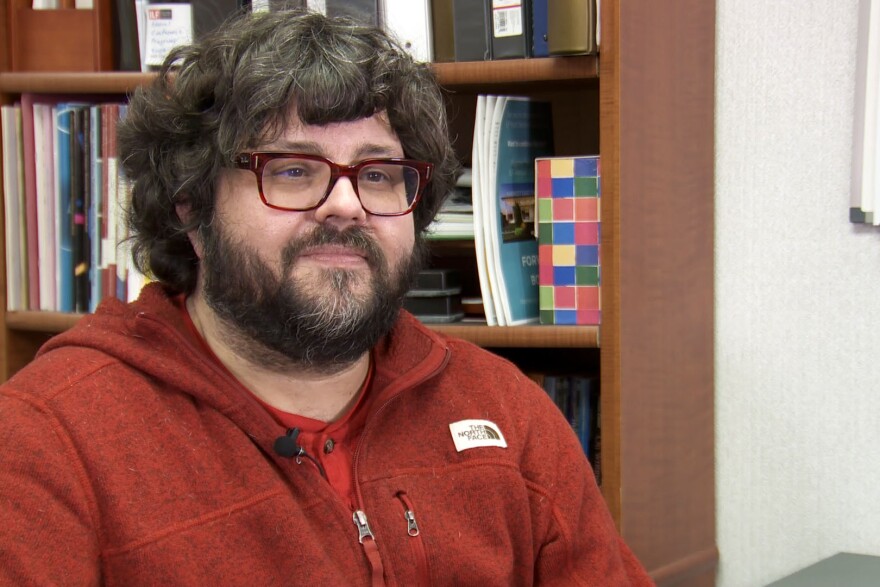Legislation that would weaken a library’s defense if prosecuted for providing harmful materials to minors is in legislative limbo.
Before the bill’s progress faltered, librarians and educators across the state voiced concern over how it could affect what materials they keep on shelves.
In a demonstration against Senate Bill 17, locals gathered for a read-in outside the Bartholomew County library last week. Many read books with themes about global warming, censorship, or LGBTQ rights.
At @MyBCPL this afternoon for a read-in organized to raise awareness of SB 17 and the effect it would have on public and school libraries
— Bente Bouthier (@BenteBout) February 16, 2022
The bill passed the Senate last month, but House leaders have said last week it won’t make it through that chamber.
Bartholomew County library director Jason Hatton said he started paying attention to the bill when it was first introduced. He was aware of a similar bill introduced last year that didn’t make it out of the Senate.
“Right now, as the law stands, we can say, ’No, we're librarians and we're doing this within the course of our work’.”

Language in Senate Bill 17 would remove “educational purposes” as a defense that public or school libraries could use if something in their collection was deemed harmful to minors – which is a criminal offense.
Under Indiana law, material harmful to minors is defined under four categories:
(1) it describes or represents, in any form, nudity, sexual conduct, sexual excitement, or sado-masochistic abuse;
(2) considered as a whole, it appeals to the prurient interest in sex of minors;
(3) it is patently offensive to prevailing standards in the adult community as a whole with respect to what is suitable matter for or performance before minors; and
(4) considered as a whole, it lacks serious literary, artistic, political, or scientific value for minors.
Hatton says the definition is too subjective.
“There are four points that are laid out. But, they're very much open to somebody else's interpretation,” he said. “So, then it leaves it basically to the county prosecutor to be making those interpretations and deciding if a librarian should be charged. Some of them are, you know, like the prurient interest of sex or the prevailing community standards--those sorts of things.”
But bill co-author Sen. Jim Tomes (R-Wadesville) said materials would have to fall into all four categories to be pursued legally, and the bill doesn’t ban anything.
“It doesn't affect your literary novels that have maybe a reference to some kind of adult sexual activity or something,” he said.
He emphasized it means libraries couldn’t argue these materials were kept for educational purposes.
He introduced the bill in a senate committee in January.
“I’m talking about raw pornographic illustrations, pictures, and words … But it’s obvious here some of the materials kids are being exposed to, is what it is,” Tomes said. “Good sense, common sense will tell you what we’re talking about here.”
But Chad Heck, a librarian with Pike High School in Marion County, said libraries don’t carry this type of material.

“We don't collect porn in school libraries. That's not what we do,” he said. “We do collect materials that may have sexuality in them. But when you look at them as a whole, that's not what their book is about. It may be a scene; it may be a part of a character's experience. But it's not porn. And so really, this law should not result in the prosecution of librarians.”
Heck agreed that the legislation left too much room for interpretation. Both he and Hatton worry legislation like SB 17 would cause a chilling effect.
“What I am concerned about is that librarians are going to be so afraid of being prosecuted, that they're going to stop collecting materials that meet the needs of their patrons.”
Hatton, in Bartholomew County, said librarians will see bills like Senate Bill 17 as a threat.
“It almost feels like, now the government is watching you, right?” he said. “The government is saying, ‘Hey, be careful what you're buying.’”

Hatton and Heck said libraries have formal processes in place if someone has complaints about library material.
Even if the language from SB 17 makes it no further this session, Betsy Burow-Flak, who teaches a course on banned books at Valparaiso University, said it marks a shift in how people view public education.
“That they should be places where people under 18 years old go to have their own family's ideas reinforced,” she said, “as opposed to the idea that a public school exists to educate people for the good of society and to introduce students to ideas they may or may not agree with.”
She said given other educational bills this session about how to teach about race and other sensitive topics, there hasn’t been as organized an effort since the 1920s to keep information away from kids. The topic then was evolution.
She added if legislation doesn’t move forward, it takes time and effort from librarians and educators to advocate for themselves.
Hatton said the legislation calls into question how he does the job he’s been trained for.
“That's provide materials for every single person in our community,” Hatton said. “We want to have those materials for everyone.”
Tomes says he will try to get SB 17’s language amended into another bill before session is over. And if it doesn’t pass in some form this year, both Tomes and co-author Jeff Raatz (R-Centerville) said it will be back in future sessions.


